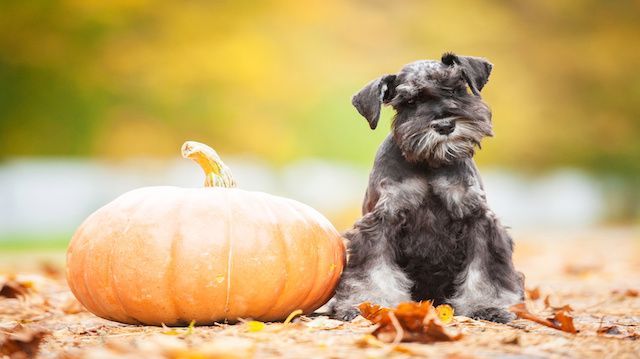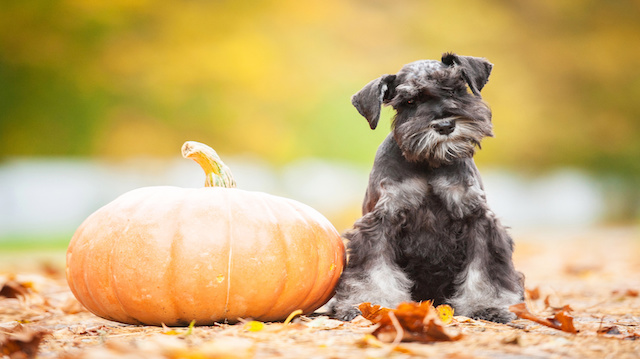
Allowing a dog to beg at the table at any time is simply creating a monster, but certain foods common at Thanksgiving can make your pet very sick, or even kill him.
The big bird
If you want to give your pet some bits of leftover turkey, that’s usually not a problem. Trim off the fat and skin before giving your dog the meat, and make sure you don’t inadvertently include turkey bones with the treat. As with all cooked bones, turkey bones pose a choking hazard for canines. Also, make sure all the odds and ends associated with turkey preparation, including string and aluminum foil, are accounted for and placed in a secure, dog-proof trash container.
The usual suspects
There are certain foods dogs should never eat, and some of them show up as part of a traditional Thanksgiving meal. These include onions, garlic, grapes, raisins and chocolate.
Onions and garlic: These two edible bulbs — along with their relatives, leeks, chives, shallots and scallions — are part of the allium family. While they are healthy foods for people, this is not the case for dogs. Consumption of any plant from the allium family can cause a dog oxidative damage to red blood cells, resulting in severe, even life-threatening, anemia. Because so many Thanksgiving foods may contain traces of onion, garlic, and the like, it is best not to feed dogs any item you suspect may contain these substances.
Grapes and raisins: Grapes and their dried counterpart, raisins, can cause kidney failure in dogs. The exact mechanism leading to kidney failure is not known, but the first indication of grape or raisin toxicity involves throwing up. The gastrointestinal distress may not become evident for 12 hours or more after the grapes or raisins were eaten.
Chocolate: This sweet treat for humans contains stimulants such as theobromine and caffeine, which can cause cardiac problems or issues with a dog’s central nervous system. The smaller the dog, the greater the risk when it comes to chocolate consumption.
Baking bread: If baking bread is part of your holiday tradition, keep your dog out of the kitchen. Eating even a small amount of bread dough can lead to catastrophe for a dog. The yeast in raw bread dough may mistake the warm interior of your dog’s stomach for an oven. Once inside him, the dough may start rising and your dog could end up with a bowel obstruction or stomach twist. If you suspect your dog ate even a small amount of raw bread dough, get in touch with your vet immediately.
 Artificial sweeteners: You may not use artificial sweeteners in your own baking, but you can never be sure what’s in pies, cakes and other baked goods brought by friends or relatives, or purchased in a store. Sugar isn’t good for your dog anyway, but the artificial sweetener xylitol is truly dangerous. A dog only needs to eat a small amount of xylitol to experience a sharp drop in blood sugar levels. Xylitol toxicity also results in liver failure and seizures, and often proves fatal. This culprit is frequently found in artificially sweetened candy and chewing gum, so keep those items away from your pet.
Artificial sweeteners: You may not use artificial sweeteners in your own baking, but you can never be sure what’s in pies, cakes and other baked goods brought by friends or relatives, or purchased in a store. Sugar isn’t good for your dog anyway, but the artificial sweetener xylitol is truly dangerous. A dog only needs to eat a small amount of xylitol to experience a sharp drop in blood sugar levels. Xylitol toxicity also results in liver failure and seizures, and often proves fatal. This culprit is frequently found in artificially sweetened candy and chewing gum, so keep those items away from your pet.
No to nuts: Nuts are on the “do not feed” list of Thanksgiving treats for dogs. While not all nuts are toxic to dogs, it’s better to be safe than sorry, especially if there are bowls of mixed nuts at your dinner. Certain nuts can cause gastrointestinal distress or potential bowel obstruction in dogs. These include the following:
- Almonds
- Black walnuts
- Hickory nuts
- English walnuts
- Japanese walnuts
- Pecans
Two other common nuts — macadamia and pistachio — contain far too much fat. A dog eating these nuts is at risk of more than a stomach upset. Any overly rich foods, the types often found on Thanksgiving tables, can trigger pancreatitis in canines.
Pancreatitis dangers
Pancreatitis is the term for inflammation of the pancreas, and this disorder is both painful and life-threatening. If your dog got into the garbage on Thanksgiving, or he received inappropriate treats or table scraps, pancreatitis can result. While any dog can suffer from pancreatitis, certain breeds appear predisposed to the condition, according to The Merck Veterinary Manual:
- Miniature schnauzers
- Poodles
- Dachshunds
- Cocker spaniels
- Yorkshire terriers
- Siberian huskies
Symptoms include vomiting, appetite loss, weakness and abdominal pain. If your dog exhibits any of these symptoms, get him to an emergency veterinarian immediately.
There’s no reason Thanksgiving can’t be as much fun for your dog as it is for the rest of your family. It just means keeping an eye on Fido’s treat and snack intake, and making sure all the guests know the rules about offering tidbits.
—The Alternative Daily
Sources:
http://www.petmd.com/dog/slideshows/seasonal/top-ten-tips-for-feeding-pets-thanksgiving-leftovers
http://www.vcahospitals.com/main/pet-health-information/article/animal-health/xylitol-toxicity-in-dogs/4340
http://www.petinsurance.com/healthzone/pet-articles/pet-health-toxins/Nut-Dangers-to-Dogs.aspx http://www.merckvetmanual.com/mvm/digestive_system/the_exocrine_pancreas/pancreatitis_in_small_animals.html
http://www.medicaldaily.com/sweetener-found-some-chewing-gum-can-be-deadly-dogs-causes-seizures-liver-failure-360292

